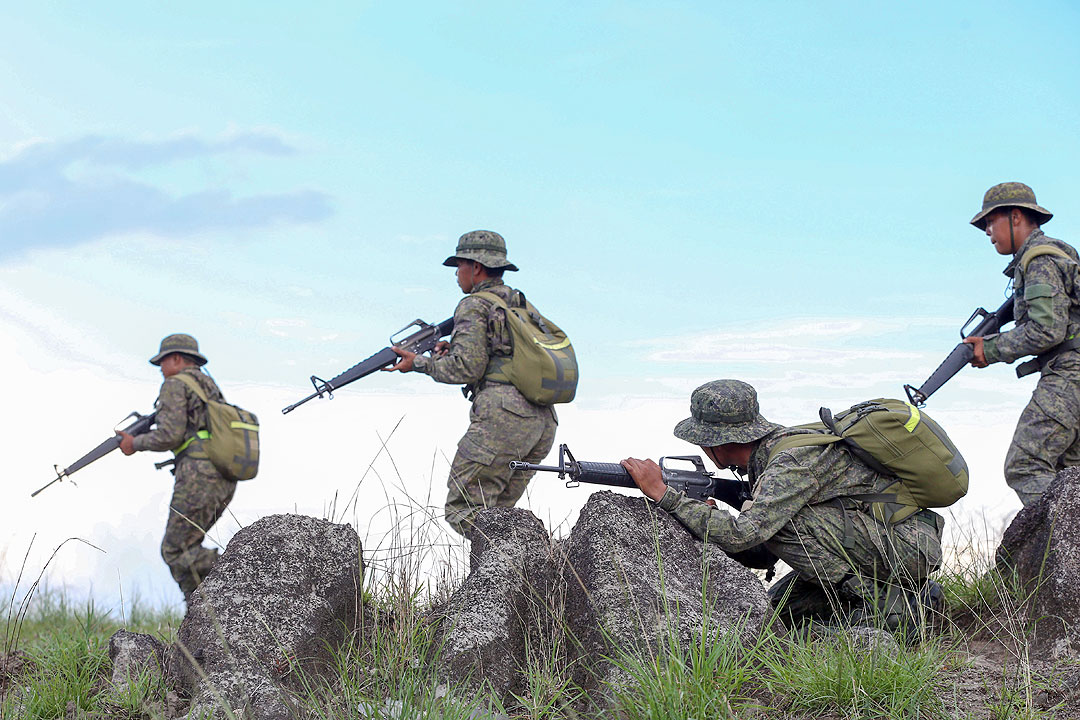Marcos: Military pension reform underway

By Kyle Aristophere T. Atienza, Reporter
PHILIPPINE President Ferdinand R. Marcos, Jr. on Wednesday said multisectoral discussions are under way to lay down the foundation for a functioning pension system for the country’s military and police.
The pension system for retired military and uniformed personnel is “such a monumental task with all the legal and financial setbacks that it has encountered,” he said at the 86th anniversary celebration of the Government Service Insurance System (GSIS).
“It is imperative that we establish the most appropriate and strategic mechanism to get it functioning — or at the very least, to start to lay the foundation for the system that will function in the long run,” Mr. Marcos Jr. said in a speech.
“Comprehensive multisectoral discussions are now ongoing,” he added, noting that the GSIS, the state pension fund, is involved in the talks.
Finance Secretary Benjamin E. Diokno in late March warned of a possible “fiscal collapse” if the government fails to reform the pension system, noting that the state had set aside as much as P130 billion for the pension program for this year alone.
He said the amount the government allots for the pension of retirees from the security sector is much bigger than the funds being earmarked for the maintenance and operating expenditures of the whole Armed Forces of the Philippines (AFP).
Under the setup, the pension of retired personnel doubles when the salary of the incumbent worker is doubled. The average monthly pension of a military worker is about P40,000.
Military or uniformed personnel who choose to retire after 20 years of service can get a pension since there is no minimum age to be eligible, Mr. Diokno said. Some personnel even get recruited at the age of 20 so they can retire by 40.
GSIS Jose Arnulfo “Wick” Veloso told reporters the GSIS would serve as the fund manager of the pension fund. He said they are studying whether the GSIS would also be tasked to hand out the pensions.
“There is nothing firm on that,” he said. “It is still under discussion. But during the discussion, our role is only as a fund manager.”
Earlier this month, Mr. Marcos said the pension fund would be depleted in the next five to six years.
To prevent that from happening, the president called for a “self-regenerating” pension program for both the AFP and Philippine National Police. The Defense department had warned that the proposed pension reform could lead to as many as 80% of the military’s enlisted soldiers retiring early.
Mr. Diokno, who has been lobbying for the reform, has said that the pension for retired military and uniformed personnel could account for as much as a third of the Armed Forces’ budget in the future.
The pension program covers members of the AFP, Bureau of Jail Management and Penology, Bureau of Fire Protection, Philippine National Police, Philippine Public Safety College, Coast Guard and Bureau of Corrections.
Among the reforms being pushed by the Finance department is the requirement for all active military personnel and new entrants to contribute to their pension instead of the government fully funding it.
The DoF has also proposed to stop automatically indexing retirees’ pension to the salary of active personnel of similar rank, and to raise the age that military and uniformed personnel get their pension to 57 from 56.
The pension program covered 137,649 retired personnel in the first quarter, the Budget department said in January.
The proposed pension reform is among the legislative priorities of the Marcos administration. It is still pending at the committee level in both houses of Congress.
Meanwhile, GSIS has started a new housing initiative, a loan program and new features in the GSIS Touch mobile app.
“These programs were implemented in direct response to the president’s directives when assuming office on July 5,” it said in a statement, citing Mr. Veloso in a speech.
The housing program, which seeks to ease the state’s 6 million-unit housing backlog, includes a rent-to-own plan for GSIS’ 15,000 residential properties, it said. It is also extending its housing loan condonation program to 2025.
The state pension fund’s multipurpose loan now offers a longer payment period of one to 15 years and 6% yearly interest. Eligibility conditions have also been relaxed, GSIS said.
It has also launched its facial recognition feature for its mobile app.
The state pension fund’s multipurpose loan now offers a longer payment period of one to 15 years and 6% yearly interest. Eligibility conditions have also been relaxed, GSIS said.
It has also launched its facial recognition feature for its mobile app. — with AMCS



